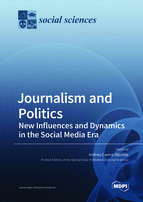Journalism and Politics: New Influences and Dynamics in the Social Media Era
A special issue of Social Sciences (ISSN 2076-0760). This special issue belongs to the section "Contemporary Politics and Society".
Deadline for manuscript submissions: closed (30 October 2021) | Viewed by 163946
Special Issue Editor
Interests: journalism; political communication; social media; digital journalism; social influence; digital media
Special Issue Information
Dear colleagues,
The relationship between journalism and politics has always played a central role in democratic societies. It is essential for setting the agenda, defining social frames of problems and issues related to the public interest, promoting public debates, as well as shaping public opinion. The emergence of the Internet and the advent of social media have led to many changes in the communication environment and the relationship dynamics, as well as power distribution between journalism and politics. Additionally, important changes have been detected in the demand–supply chain of political information.
This new environment has boosted the development of a new network logic and a hybrid system where old and new media constantly interrelate through platforms that play a central role in the current social dynamics. The processes of production, distribution, and consumption of political information were transformed by the rise of digital media. Several new phenomena changed the game rules between journalism and politics. This includes the growing number of sources of information that increased the competition and decreased journalists’ monopoly over news. It also includes the new forms of political news consumption and its consequences on the political culture of citizens, as well as the prevalence of fake news and sophisticated propaganda and disinformation strategies. Moreover, there has also been transformation in the distribution of power within the communicative system and the exercise of social influence by media, journalists, as well as political actors.
The objective of this Special Issue is to examine the processes that are transforming the relationship between journalism and politics in this new digital communicative environment. Likewise, we are also interested in critically exploring the consequences and effects of these phenomena on political communication, democracy, and society. Accordingly, we hope to receive high-quality research that employs a wide range of methodologies that utilize traditional (i.e., content analysis, semistructured interviews, etc.) and/or innovative computational methods. We call for the submission of papers that focus on:
- The new parameters of relationship and interaction between journalists and politicians in social media;
- The strategies and communicative behavior of political actors in digital media;
- The productive routines of political journalists in social media;
- The role of social media and political journalism in the dissemination of populism;
- The fake news and disinformation in social media and their effect on political communication as well as democracy;
- The fact-checking initiatives in the area of political information;
- The effects of digital media on selective exposure and polarization;
- The strategies of spectacularization and political infotainment in social media;
- The changes in the construction of the public agenda in the digital environment;
- The transformations in the exercise of social influence by media and political journalists in the digital context;
- The role of political influencers and digital opinion leaders in the digital environment;
- The use of algorithms in political journalism;
- The use of data-driven campaigns and online political microtargeting techniques as well as their democratic consequences;
- The use of new applications and digital tools such as mobile instant messaging apps in journalism and political communication;
- The new ways of consuming political news in the digital environment;
- The changes in the parameters of the mediatization of politics;
- The impact of digital communication strategies and techniques of journalists as well as politicians on the political culture of citizens;
- The changes and consequences of the digital communicative environment on the conditions of a healthy democracy.
We seek to receive papers that contribute to the advancement of knowledge in this important field.
Prof. Andreu Casero-Ripollés
Guest Editor
Manuscript Submission Information
Manuscripts should be submitted online at www.mdpi.com by registering and logging in to this website. Once you are registered, click here to go to the submission form. Manuscripts can be submitted until the deadline. All submissions that pass pre-check are peer-reviewed. Accepted papers will be published continuously in the journal (as soon as accepted) and will be listed together on the special issue website. Research articles, review articles as well as short communications are invited. For planned papers, a title and short abstract (about 100 words) can be sent to the Editorial Office for announcement on this website.
Submitted manuscripts should not have been published previously, nor be under consideration for publication elsewhere (except conference proceedings papers). All manuscripts are thoroughly refereed through a double-blind peer-review process. A guide for authors and other relevant information for submission of manuscripts is available on the Instructions for Authors page. Social Sciences is an international peer-reviewed open access monthly journal published by MDPI.
Please visit the Instructions for Authors page before submitting a manuscript. The Article Processing Charge (APC) for publication in this open access journal is 1800 CHF (Swiss Francs). Submitted papers should be well formatted and use good English. Authors may use MDPI's English editing service prior to publication or during author revisions.
Keywords
- digital journalism
- political communication
- social media
- political journalism
- digital media
Benefits of Publishing in a Special Issue
- Ease of navigation: Grouping papers by topic helps scholars navigate broad scope journals more efficiently.
- Greater discoverability: Special Issues support the reach and impact of scientific research. Articles in Special Issues are more discoverable and cited more frequently.
- Expansion of research network: Special Issues facilitate connections among authors, fostering scientific collaborations.
- External promotion: Articles in Special Issues are often promoted through the journal's social media, increasing their visibility.
- e-Book format: Special Issues with more than 10 articles can be published as dedicated e-books, ensuring wide and rapid dissemination.
Further information on MDPI's Special Issue polices can be found here.






